Making a difference to workplace Safety and Health beyond our qualifications
NEBOSH is internationally recognised for its health, safety and environmental qualifications. By helping ensure and improve the professional competence of safety and health practitioners around the world we contribute to saving lives, by helping prevent accidents and ill health every day. We provide the foundations for organisations to tackle changing and emerging risks at work and to nurture their human capital. Our learners contribute to a safer and more sustainable economy, benefiting employees and wider society. But we can do more.
As a registered charity our objective is ‘the preservation of health and wellbeing by the promotion of high standards of safety, health and environmental protection at work’. In our vision for 2027 we are committed to making a ‘bigger difference to the world of OSH’, beyond our qualifications'. In our short video NEBOSH Chief Executive, Andy Shenstone, explains how the Social Purpose Programme supports this vision:
Vision and Purpose
Globally, an estimated 2.93 million people are killed every year by industrial accidents and diseases, more than 8,000 a day. Those fatalities are disproportionately clustered in high-hazard industries and parts of the world where financial and educational resources are limited, regulation and enforcement are patchy and employers’ understanding of the value of protecting workers is poor.
To help address this unequal toll of workplace harm and to further meet our commitment to reducing workplace injury and illness, we recently launched our Social Purpose Programme. The programme, approved by our trustees, will run for three years initially and diversifies our activity into advocacy and support for people that cannot advocate for themselves, particularly people working in economically-challenged regions of the world.
In parts of South Asia and North and West Africa, for example, there are opportunities to raise awareness among employers and workers of workplace risks and the benefits of protection. Closer to home there are under-served needs among workers in non-standard forms of employment for better understanding of occupational risks and protective measures.
Target Audience
Since the programme’s launch our Social Development team has commissioned research to help identify specific target areas, namely:
- Industries and occupations currently underrepresented and where accident and fatality rates are high.
- Regions where safety and health awareness and oversight is limited.
- Organisations that are currently working to address gaps in OSH awareness, the initiatives they are undertaking and potential opportunities for partnerships.
Specifically, we expect to support initiatives including study programmes for labour inspectors to raise their ability to steer small employers towards better safety and health standards. We can fund research that throws light on the occupational health risks of many thousands of workers in informal jobs in extractive industries to enable planning for better health education. We are also supporting a programme to provide online safety and health content for self-employed people in the UK.
Initially, the Social Purpose Programme will focus strongly on occupational safety and health, where there is greatest alignment with our insight and expertise. But as it matures, we hope to broaden the programme’s remit to include support for environmental and wellbeing initiatives as well. The programme will run initially for three years.
Our Social Purpose Programme aims to build on the positive impact of our qualifications in improving standards of worker protection around the world, helping to raise safety and health provision in regions and sectors which need it most. It will be a major contribution to achieving NEBOSH’s mission to create sustainable business and a safer world of work.
Our Projects
Details on our current projects are available below. These will be monitored closely so we can evaluate their effectiveness, and model success to guide future funding. As the programme develops we also plan to report publicly on its impact.
Women’s PPE Research (Phase-I)
Society of Women in Safety, Health and Environment – Africa (SOWSHE-A)
This project in Phase-I is focused on researching women’s PPE needs in Africa, centred on Nigeria. It aims to improve the design, availability, and suitability of PPE for women, working with allied organisations to ensure effective outreach.
Strategic theme: Tackling high accident rates in communities, industries and countries that lack OSH awareness and education.
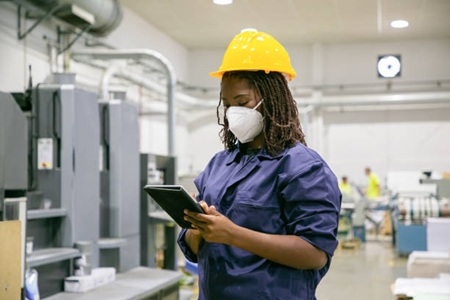
Empower Women, Youth, and Motivated Learners with Limited Resources in African Countries
SAFENESS
This project provides targeted sponsorship opportunities for women, young individuals, and motivated learners with limited financial resources across African countries (with priority to Francophone countries). In total 50 learners will receive sponsorship for IGC French & English, with the teaching/training having started last month.
Strategic themes: Addressing cost and other barriers to increase access to OSH qualifications and training. Increasing diversity in the UK and Global OSH professional workforce.
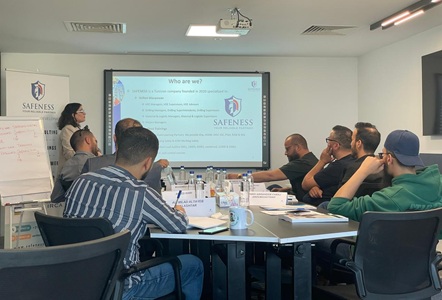
Training Migrant Workers in Occupational Health
Rewaq Ousha Educational Institute
This project trains migrant workers in Dubai’s construction, cleaning and hospitality sectors on OSH. Phase-I includes developing training materials on ergonomics, emergency procedures, PPE use, first aid & CPR, and delivering free training sessions to improve worker safety.
Strategic theme: Tackling high accident rates in communities, industries and countries that lack OSH awareness and education.

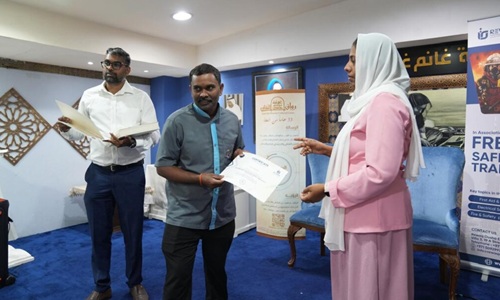
Safety Signs at Work
The Race Equality Centre (TREC)
This project focuses on improving workplace safety for individuals who do not speak English as a first language. Phase I involves training Community and Workplace Learning Assistants to deliver ESOL Safety Signs at Work courses, increasing understanding and awareness of safety signage across communities and workplaces in the East Midlands.
Strategic theme: Addressing cost and other barriers to increase access to OSH qualifications and training
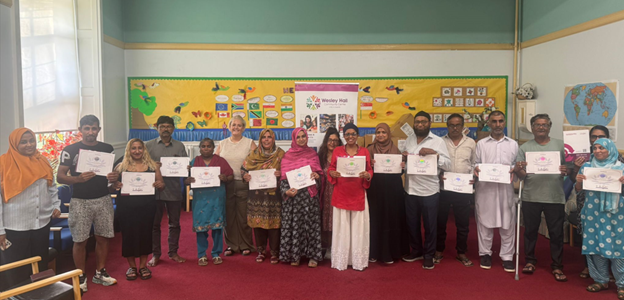
Deaf OSH Awareness Training
Kaileys Consortium and Vital Signs
This project aims to create inclusive, deaf-friendly OSH training for SMEs in Kenya. Phase I involves developing training programs with sign language interpretation and visual aids, training OSH instructors in sign language, piloting courses for deaf individuals in Nairobi, researching workplace hazards for the deaf community, and engaging stakeholders to advocate for inclusive OSH policies. Addressing cost and other barriers to increase access to OSH qualifications and training
Strategic theme: Tackling high accident rates in communities, industries and countries that lack OSH awareness and education.

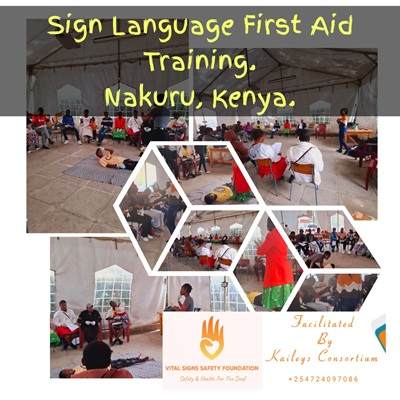
Improving Safety Standards in Boiler Operations in Kerala
Kerala Directorate of Boilers and Factories
This project will provide NEBOSH training to 44 inspectors (25 International Diploma, and 19 International General Certificate) from the Directorate to improve their health and safety knowledge, awareness and practice. This will upskill the inspectors to pass knowledge, training and guidance on to existing and incoming staff in the Directorate and appropriate workplaces across Kerala.
Strategic themes: Tackling high accident rates in communities, industries and countries that lack OSH awareness and education. Addressing cost and other barriers to increase access to OSH qualifications and training
Mental Health for Healthcare workers in Zimbabwe
Society of Occupational Medicine (SOM)
This is a one year project designed to support the mental wellbeing of healthcare workers in Gweru Provincial Hospital and Mpilo Central Hospital. Funds will be used to support capacity building, a baseline healthcare worker assessment, risk management activities and a review of the workplace mental health programme. With this data, Dr Mayo will identify appropriate interventions and strategies with a view to implement them in Phase II of the project.
Strategic themes: Tackling high accident rates in communities, industries and countries that lack OSH awareness and education. Addressing cost and other barriers to increase access to OSH qualifications and training.
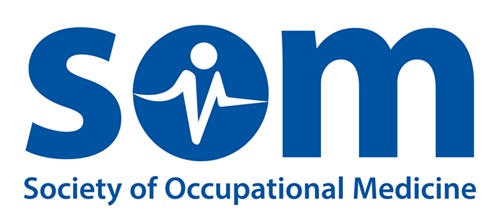



Artisanal and Small-Scale Mining Research (phase-I)
Society of Occupational Medicine (SOM) and the International Occupational Medicine Society Collaborative (IOMSC)
This project aims to protect and improve the health, safety, livelihoods, and wellbeing of people working in Artisanal and Small-Scale mining (ASM) and nearby communities. It focuses on increasing awareness of hazards, reducing risks, and promoting internationally recognised safety standards through research and advocacy.
Strategic theme: Tackling high accident rates in communities, industries and countries that lack OSH awareness and education.